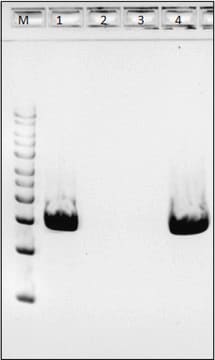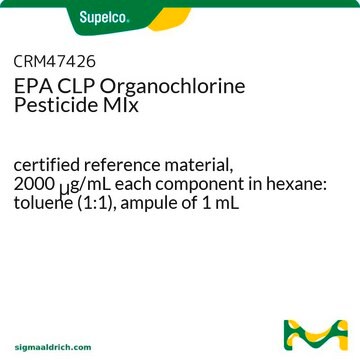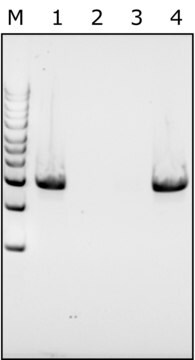A3422
Achromopeptidase from bacteria
partially purified powder, ≥20,000 units/mg solid
Synonym(s):
ACP, Achromopeptidase
About This Item
Recommended Products
form
partially purified powder
Quality Level
specific activity
≥20,000 units/mg solid
mol wt
27 kDa
foreign activity
Collagenase, present
storage temp.
−20°C
Application
- in the homogenization step for genomic DNA extraction from microbial biofilm
- in the lysis of gram-positive strains(
- for DNA extraction from Nocardia strains
Biochem/physiol Actions
Unit Definition
Physical form
Signal Word
Danger
Hazard Statements
Precautionary Statements
Hazard Classifications
Resp. Sens. 1
Storage Class Code
11 - Combustible Solids
WGK
WGK 3
Flash Point(F)
Not applicable
Flash Point(C)
Not applicable
Personal Protective Equipment
Certificates of Analysis (COA)
Search for Certificates of Analysis (COA) by entering the products Lot/Batch Number. Lot and Batch Numbers can be found on a product’s label following the words ‘Lot’ or ‘Batch’.
Already Own This Product?
Find documentation for the products that you have recently purchased in the Document Library.
Customers Also Viewed
Protocols
To measure achromopeptidase activity, this procedure uses bacterial cells and a turbidimetric rate assay. Turbidity is measured at 600 nm using a spectrophotometer.
To measure achromopeptidase activity, this procedure uses bacterial cells and a turbidimetric rate assay. Turbidity is measured at 600 nm using a spectrophotometer.
To measure achromopeptidase activity, this procedure uses bacterial cells and a turbidimetric rate assay. Turbidity is measured at 600 nm using a spectrophotometer.
To measure achromopeptidase activity, this procedure uses bacterial cells and a turbidimetric rate assay. Turbidity is measured at 600 nm using a spectrophotometer.
Related Content
Find cell lysis and protein extraction reagents like cell lysis buffers, protein extraction kits, extraction enzymes, and other lysis enhancers for isolating and purifying proteins.
Find cell lysis and protein extraction reagents like cell lysis buffers, protein extraction kits, extraction enzymes, and other lysis enhancers for isolating and purifying proteins.
Find cell lysis and protein extraction reagents like cell lysis buffers, protein extraction kits, extraction enzymes, and other lysis enhancers for isolating and purifying proteins.
Find cell lysis and protein extraction reagents like cell lysis buffers, protein extraction kits, extraction enzymes, and other lysis enhancers for isolating and purifying proteins.
Our team of scientists has experience in all areas of research including Life Science, Material Science, Chemical Synthesis, Chromatography, Analytical and many others.
Contact Technical Service













